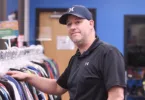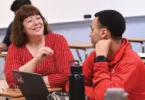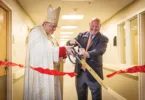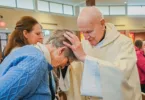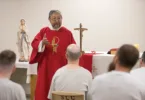By Jill Ragar Esfeld
jill.esfeld@theleaven.org
In the beginning . . . we were called to welcome the stranger.
Yes, even from Old Testament times, our faith tradition has been rooted in hospitality, explained Bill Scholl, social justice consultant for the archdiocese.
“In the Book of Leviticus,” he said, God reminds the chosen people that “once you were aliens in a strange land.
“In the Gospel, Our Lord takes it to an even higher standard.”
In response to that biblical imperative and the desperate need of so many refugees at this time, therefore, Pope Francis has called for a worldwide campaign called “Share the Journey” that promotes solidarity with migrants and refugees.
Here in the archdiocese, Archbishop Joseph F. Naumann plans to mark “Share the Journey” by designating Dec. 12, the feast of Our Lady of Guadalupe, as a day of prayer.
On that day, he is asking Catholics of the archdiocese to attend Mass and pray that our government will find just and humane solutions to immigration reform.
Father Oswaldo Sandoval, pastor of All Saints Parish in Kansas City, Kansas, is passionate about this issue — and for good reason.
“I know being an immigrant family is not easy,” he said. “I thank God that he gave me the opportunity to experience what a lot of these families are facing.”
A long and rocky road
Father Sandoval understands the plight of the immigrant because it is part of his own story.
He was born in El Salvador just a few years before the country became engulfed in a brutal civil war.
“Growing up, it was difficult for me seeing all the things that were happening,” he said. “I knew it wasn’t right.”
El Salvador became a dangerous place for young men — many were being forcibly recruited into the army.
And so, Father Sandoval’s parents made the difficult decision to send their six sons to the United States — one by one — for political asylum.
Father Sandoval was only 16 and alone on his voyage from El Salvador to Guatemala, and then on to California, where he joined his older brothers.
His parents eventually immigrated and the family settled in Emporia, where he was able to complete high school.
“Then I felt a call,” he said. “That’s when I began my journey to the seminary. I was under [political asylum] at the time.”
While in the seminary, Father Sandoval qualified for TPS (Temporary Protected Status).
“That’s how I stayed in the country,” he said. “And then, from that, I changed to F1 status, which allowed me to continue my studies at Conception [Seminary in Conception, Missouri]. I stayed [at that status] until I was ordained in 2012.
“But when I tried to become a resident? At that point, it was difficult for me.”
Father Sandoval found that the only way he could transition to resident status was to travel to the U.S. embassy in El Salvador, sit for an in-person interview and then hopefully re-enter the United States legally.
“The chances were big that I was not going to be allowed to come back,” he said.
Last March, with trust in God and the prayers of friends and family, Father Sandoval returned to the land of his birth.
“But I was afraid not knowing what my future was going to be,” he said. “I knew that I, perhaps, was not going to be able to come back and continue to be a part of what I know as my home.
“After being here for more than half my life, I was, like, ‘If I can’t come back, what will I do there?’
“Especially being a priest?”
At the time, Father Sandoval was assigned at Good Shepherd Parish in Shawnee. His parishioners united in prayer for his safe return.
“I think the prayers of those people had such an impact on how things turned out,” he said. “God just put the right people in the interviews, and I didn’t have any problem.
“When I came back, I had letters from the schoolchildren, saying ‘Welcome home.’
“Having that was such a good moment to me.”
Father Sandoval’s own experience makes him particularly concerned about the plight of other immigrants, especially young people who would be impacted by termination of the Deferred Action for Childhood Arrivals (DACA)
“I see these young people,” he said. “A lot of them are parishioners here at All Saints. They’re so afraid.
“The only home they know is this country. English is their first language because that’s what they learned at school.
“They have been prepared to be successful in this country.”
Yet, Scholl said the issue of immigration is a polarizing one, even within the Catholic community.
Even as the U.S. Conference of Catholic Bishops (USCCB) lobbies Congress for comprehensive immigration reform, he said, some Catholics don’t understand why bishops are encouraging the government to have policies that are welcoming to immigrants and refugees.
“What the bishops are saying,” said Scholl, “is we should all be working very hard on both sides of the aisle to try to find humane solutions.
“And to realize that, at the end of the day, these are human beings made in the image and likeness of God.”
“The sad reality is we can’t let everybody in that would like to come,” he continued. “But that doesn’t mean that we can’t find solutions, or that we can’t show any mercy.”
Because so many emigrate from Catholic countries, moreover, it becomes a personal issue.
“We don’t just have the mandate to help the stranger,” said Scholl. “This is family. These are baptized Catholics.
“We should be welcoming them and seeking to take care of them.”
In an effort to do just that, Catholics of the archdiocese will unite on Dec. 12 in a powerful communion of prayer for a just and humane path to fixing the faults of the current immigration system, especially for the most vulnerable among us.
“That’s what we need to pray about,” said Father Sandoval. “Those who will make the decision, I hope they make the right decision for the young people.
“That’s my prayer.”


